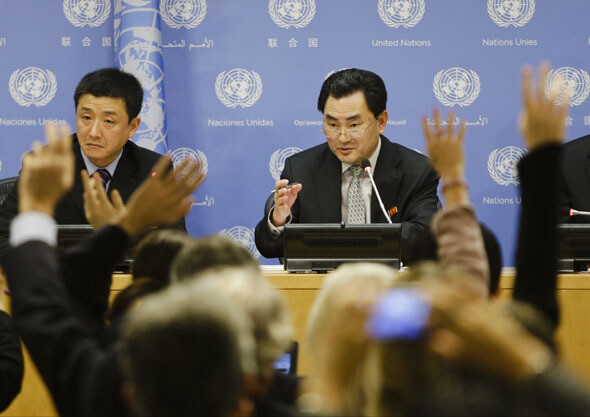hankyoreh
Links to other country sites 다른 나라 사이트 링크
Obama administration seeking additional sanctions on North Korea

The Sony Pictures hacking firestorm continues to rage, with the Barack Obama administration and US Congress speaking unanimously on Jan. 13 about the need for additional sanctions against alleged culprit North Korea.
The company suffered the hacking attack after producing a film, “The Interview,” which features a fictitious assassination of North Korean leader Kim Jong-un.
Speaking at a hearing on “The North Korean Threat: Nuclear, Missiles and Cyber” organized by the House Foreign Affairs Committee on Jan. 13, US special representative for North Korea policy Sung Kim said, “We are under no illusions about the DPRK’s willingness to abandon its illicit weapons, provocations, and human rights abuses on its own.”
“We will apply pressure both multilaterally and unilaterally to increase the costs to the DPRK of its destructive policy choices,” Kim continued.
Assistant Treasury Secretary for terrorist financing Daniel Glaser said, “As long as [North Korea engages in illicit activities], Treasury will continue to deploy the tools at its disposal to raise the financial cost of such behavior and induce the government of the DPRK to abide by its international obligations.”
While both officials’ remarks referred clearly to sanctions, neither offered any new information about the possible punishment. In explaining an executive order issued by Obama on Jan. 2, they said additional sanctions would result if North Korea engaged in new provocations.
“If North Korea holds another nuclear test, things may change, but for now they’re sending a warning message to Pyongyang,” said one diplomatic source.
The Foreign Affairs committee’s chairman, Republican representative Ed Royce, said he planned to sponsor a bill for financial sanctions shortly, saying that the flow of foreign currency to the regime in Pyongyang must be stopped if North Korea’s provocations are to be halted.
“We need to step up and target those financial institutions in Asia and beyond that are supporting the brutal and dangerous North Korean regime,” Royce said.
Most of the 20 members of Congress from both sides of the aisle who were present at the hearing agreed on the need for stronger sanctions.
Meanwhile, North Korean UN deputy ambassador An Myong-hun addressed Pyongyang’s recent proposal to temporarily halt nuclear testing in exchange for canceling joint military exercises between South Korea and the US.
“We are prepared to explain to the US ourselves about the motivation behind this proposal,” An said.
Delivering his remarks at a press conference organized at the UN headquarters in New York on Jan. 13, An said, “If this proposal is accepted, many things will become possible that would have very significant implications for the Korean Peninsula this year.”
Analysts took the remarks as a sign that Pyongyang plans to turn to the international press to pressure Washington into direct dialogue if Washington rejects the proposal. An did not answer questions about what specifically would happen if the US either accepts the proposal or turns it down.
By Park Hyun, Washington correspondent
Please direct questions or comments to [english@hani.co.kr]

Editorial・opinion
![[Column] Park Geun-hye déjà vu in Yoon Suk-yeol [Column] Park Geun-hye déjà vu in Yoon Suk-yeol](https://flexible.img.hani.co.kr/flexible/normal/500/300/imgdb/original/2024/0424/651713945113788.jpg) [Column] Park Geun-hye déjà vu in Yoon Suk-yeol
[Column] Park Geun-hye déjà vu in Yoon Suk-yeol![[Editorial] New weight of N. Korea’s nuclear threats makes dialogue all the more urgent [Editorial] New weight of N. Korea’s nuclear threats makes dialogue all the more urgent](https://flexible.img.hani.co.kr/flexible/normal/500/300/imgdb/original/2024/0424/7317139454662664.jpg) [Editorial] New weight of N. Korea’s nuclear threats makes dialogue all the more urgent
[Editorial] New weight of N. Korea’s nuclear threats makes dialogue all the more urgent- [Guest essay] The real reason Korea’s new right wants to dub Rhee a founding father
- [Column] ‘Choson’: Is it time we start referring to N. Korea in its own terms?
- [Editorial] Japan’s rewriting of history with Korea has gone too far
- [Column] The president’s questionable capacity for dialogue
- [Column] Are chaebol firms just pizza pies for families to divvy up as they please?
- [Column] Has Korea, too, crossed the Rubicon on China?
- [Correspondent’s column] In Japan’s alliance with US, echoes of its past alliances with UK
- [Editorial] Does Yoon think the Korean public is wrong?
Most viewed articles
- 1‘We must say no’: Seoul defense chief on Korean, USFK involvement in hypothetical Taiwan crisis
- 2N. Korean delegation’s trip to Iran shows how Pyongyang is leveraging ties with Moscow
- 3‘Weddingflation’ breaks the bank for Korean couples-to-be
- 4Korea sees more deaths than births for 52nd consecutive month in February
- 546% of cases of violence against women in Korea perpetrated by intimate partner, study finds
- 6[Column] Park Geun-hye déjà vu in Yoon Suk-yeol
- 7Will NewJeans end up collateral damage in internal feud at K-pop juggernaut Hybe?
- 8Amnesty notes ‘erosion’ of freedom of expression in Korea in annual human rights report
- 9[Editorial] New weight of N. Korea’s nuclear threats makes dialogue all the more urgent
- 10[Column] Yoon’s first 100 days should open our eyes to pitfalls of presidential system